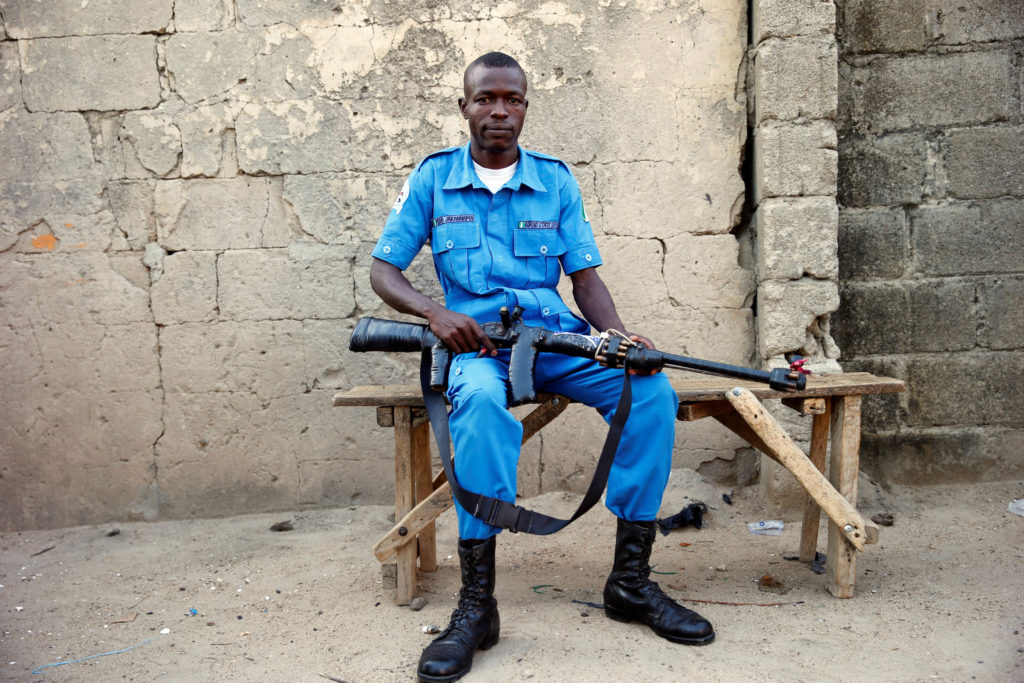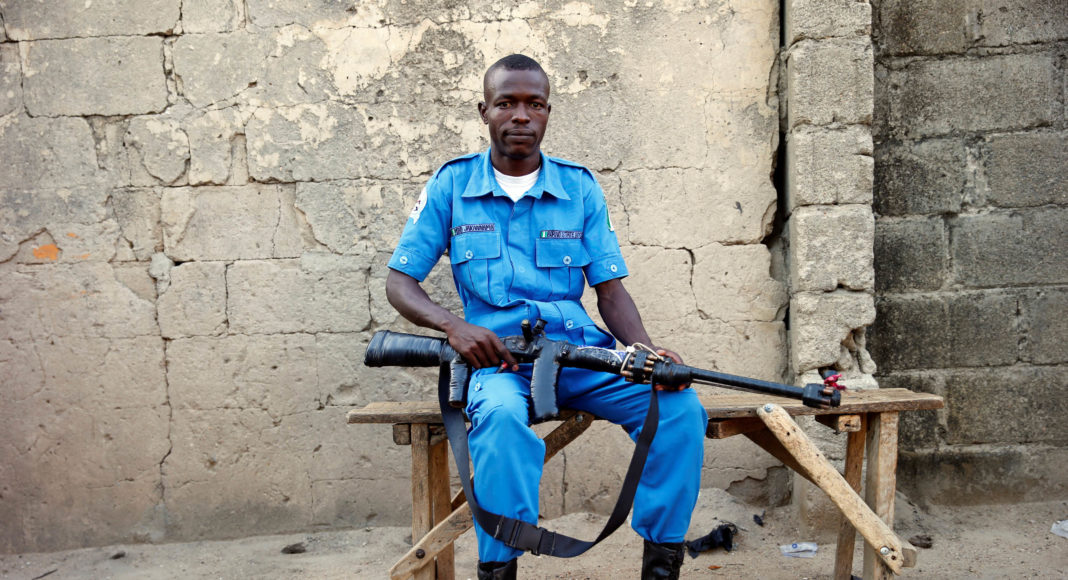By Hauwa Shaffii Nuhu
LAPAI TOWN, Nigeria — On January 17th, 2021, at around 2 am, gunmen suspected to be members of a yet unidentified criminal gang attacked the Government Science College in Kagara, Niger State. Though their identity remains unknown, there are speculations that they are members of some local groups believed to be following in the steps of Boko Haram.
The Kagara abduction was not the first mass abduction or kidnapping in the north-central state in recent times. Shortly before, a bus carrying 53 people in Kundu village was hijacked and all the occupants abducted. They were released about two weeks later. Lone kidnappings and killings have slowly infiltrated the state, particularly in towns like Mariga, Lapai, Kagara and Lavun.
In October 2020, the attacks became so frequent they overwhelmed local police and security forces, and in a desperate attempt to curb insecurity in some of the affected towns, the Niger State government turned to vigilante groups known as “‘Yan Banga” in northern Nigeria. The term, translated from Hausa, means “members of vigilantism.” The groups usually comprise young and middle-aged men who are often hunters and are paid very low stipends by the government. Despite the possible risks, the strategy has been relatively successful.
The frequency of the attacks has dropped remarkably since the vigilante groups started operations, according to residents of some of the affected areas. The civilian groups have reportedly neutralized about 40 “bandits” during a single face-off in Kutigi, and more have been arrested and handed over to the police in Mariga and Lapai. However, many areas remain vulnerable.
“The vigilante groups have actually been helpful, especially in all the local government areas in Zone A of Niger State where banditry has been rampant,” said Sadiq Mustapha, a resident of Lapai town. The state government had followed a local government initiative, he explained. “Even before the Niger State government intervened and empowered the vigilante groups, the Chairman of Lapai Government Area already armed them with guns and other weapons,” Mustapha said.
“Before banditry activities escalated, there was this local traditional security system that has been in place in Lapai for years, founded by the Emirate council,” Mustapha explained. In recent years, however, attackers have acquired more sophisticated weapons and have overpowered the traditional security system. “But when the chairman and state government began to empower them and the ‘Yan Banga groups as well as hunters, we witnessed a marked improvement,” he added.
So far, the groups have not acted out of the bounds of the law, despite having been in operation since last year. Even though for now there are few problems with the vigilantes, experiences in Borno state and Burkina Faso provide cautionary tales. In both cases, the groups have at some point turned against the state to carry out violent attacks, using weapons they were entrusted and empowered with by the government.

Borno State in north-eastern Nigeria has employed vigilante groups to fight Boko Haram. The groups have been accused of turning against vulnerable villages and attacking them in almost the same horrific methods that Boko Haram use. Burkina Faso empowered vigilante groups—known locally as “Kolweogo”—when security broke down following the country’s 2014 revolution and 2015 failed coup attempt by General Gilbert Diendéré. The Kolweogo have since been accused of some of the worst crimes in the country, and in some cases have acted more as ethnic militias than citizens concerned with security.
Experts say that even though empowering the civilian groups might provide a short term security fix, the policy is not sustainable or beneficial for states in the long run. Bulama Bukarti, a human rights lawyer and researcher in conflicts resolution said that the Niger state vigilantes could turn into a security threat themselves.
“Under the Fire Arms Act, you cannot authorize or procure weapons for civilians or even vigilante groups unless where, for example, the president gives the license. And from what we know of Niger state, they did not liaise with the federal government to get such license,” Bukarti explained, arguing that the circulation of unlicensed firearms could create further problems down the line.
Even when the weapons are distributed lawfully, their presence could also create a whole other menace. “Especially because we have seen, for example, in places like Zamfara State, where the vigilante groups acted extra-constitutionally when the Hausas within them began to witch-hunt the Fulani people in the communities,” Bukarti told Sahelien.com.
There are scanty leads as to where or how the groups known variously as “bandits” or “terrorists” who carry out the attacks procure their weapons, but some reports point to arms trafficking along the porous Nigeria-Niger border. During the attack at Government Science College, they reportedly killed one pupil, and abducted a total of 42 persons. The hostages were released a week later.
Bukarti said that the vigilantes will require more sophisticated weapons to keep up with the gunmen who carry out the attacks. “I don’t think Niger State’s plan—the one I have heard—can be sustainable, especially with criminals wielding weapons like the AK-47, general purpose machine guns, and RPGs, and especially if the vigilante groups won’t be given weapons that will match those of the criminals,” he said.
Abdullahi Umar Evuti, senior special adviser to the Lapai local government chairman, said that the government trains the vigilantes before arming them. “We’re aware that the vigilante groups have an intelligence problem, and this is why we give them intelligence training before arming them and letting them operate. The training teaches them about laws and even how to handle civil cases because they are closer to the localities and the people. They also do not operate independently; before they go on any operations, they first report to the police. And afterwards, they have to revert to the police. They are also not allowed to execute offenders,” Evuti told Sahelien.com.
Before resorting to vigilantes, Evuti said, the chairman of the Lapai local government had first sought to boost state police by speaking with the now former Inspector General of Police. The IGP sent down 80 members of the police force, who rely on vigilantes who are more familiar with the area to guide them.
Idris Ibrahim, a member of one of the vigilante groups who has been involved in active operations for about three months, explained that even though they’re always accompanied by police on their missions, the vigilantes outnumber the police by a lot, and are usually more likely to travel ahead of the police.
“We usually do not wait for the bandits to attack, we seek them out in their hideouts and capture them. Because when they attack, there are bound to be casualties,” Ibrahim told Sahelien.com. “Three weeks ago, we were informed that they were about to attack one village. By the time we made it down to the village, they had already left. But thankfully, they didn’t hurt anyone,” he said.
Evuti, the senior adviser to the Lapai local government chairman, said that the most recent attack happened three weeks ago, with about twenty criminals attacking the town. However, only three out of the 20 were armed with guns. “This shows that they are running out of ammunition because the local groups have been successful in disarming them during the several previous attacks,” he said.

